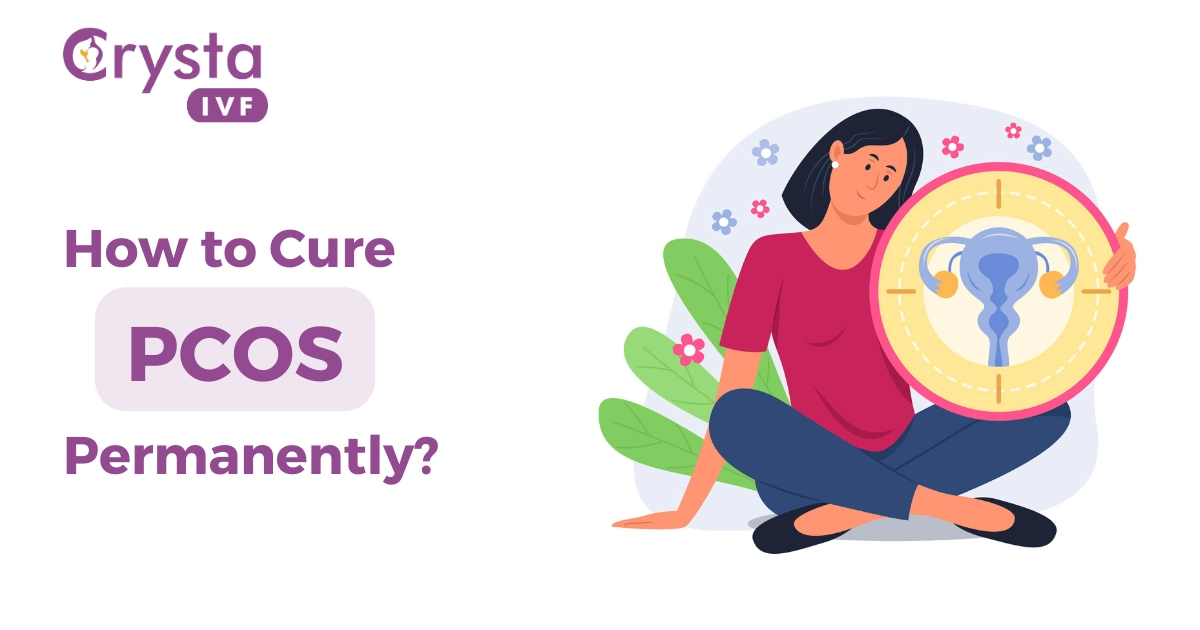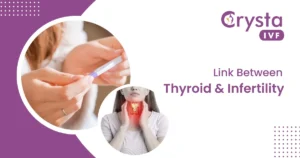Polycystic Ovary Syndrome (PCOS) involves hormonal imbalances that prevent the uterine lining from shedding, often resulting in an Enlarged Uterus. This tissue accumulation can create a hostile environment for embryo implantation or disrupt sperm transport. Effectively managing PCOS helps reduce a Bulky Uterus and improves the chances of a successful pregnancy
Polycystic Ovary Syndrome (PCOS) is one of the most common hormonal disorders among women of reproductive age — but it’s also one of the most misunderstood.
You may have seen endless posts or videos claiming “natural cures” for PCOS. Let’s clear this up right away:
According to the NHS, PCOS cannot be cured permanently.
However — and this is the hopeful part — it can be managed so effectively that symptoms almost disappear, and many women go on to lead completely healthy, fertile, balanced lives.
This blog will walk you through how to do exactly that — from lifestyle changes to medical treatments and natural remedies backed by science.
What Exactly Is PCOS?
PCOS (Polycystic Ovary Syndrome) affects how your ovaries work. It’s mainly linked to hormone imbalance and insulin resistance.
According to the NHS and World Health Organization (WHO), three main features define PCOS:
- Irregular or absent periods – due to disrupted ovulation
- Excess male hormones (androgens) – causing acne, excess facial hair, or hair thinning
- Polycystic ovaries – where the ovaries contain multiple small fluid-filled follicles
Not everyone has all three features, and symptoms can vary — which is why treatment is often personalized.
Why PCOS Can’t Be “Cured” (But Can Be Controlled)
There’s no pill, herb, or surgery that permanently removes PCOS.
The reason? It’s a metabolic-hormonal condition influenced by genes, hormones, and lifestyle.
But the good news – you can put it into long-term remission by correcting those imbalances through sustained lifestyle and medical support.
Many women who make these changes see:
- Regular menstrual cycles
- Improved fertility
- Clearer skin and less hair growth
- Stable mood and weight
So while PCOS isn’t “curable,” it’s absolutely manageable – even reversible in effect.
Step 1: Fix the Foundation — Lifestyle Changes
According to the NHS, lifestyle change is the most effective treatment for PCOS, especially if you’re overweight or have insulin resistance.
Eat Smart: The PCOS-Friendly Diet
A balanced diet can work better than medicine for many women.
Here’s what experts recommend:
Eat more:
- Whole grains (brown rice, oats, quinoa)
- Lean protein (chicken, fish, tofu, eggs)
- Fresh fruit and vegetables (5+ portions a day)
- Healthy fats (avocado, olive oil, nuts, seeds)
Limit:
- Sugary foods and drinks
- White bread, pasta, processed snacks
- Fried and fast foods
Learn more: Nutrition and PCOS
Why it works:
Reducing sugar and refined carbs helps improve insulin sensitivity — and better insulin control means fewer hormonal imbalances.
Bonus Tip:
Try a low-GI (glycemic index) diet — it keeps blood sugar levels steady and has been shown in studies to reduce PCOS symptoms.
Move More: Exercise for Hormonal Balance
You don’t need to hit the gym for hours. What matters is consistency.
Aim for:
- 150 minutes of moderate exercise per week (like brisk walking, cycling, dancing)
- Add strength training twice a week (to boost metabolism and regulate insulin)
Even a 5% weight loss can significantly improve PCOS symptoms, according to the NHS.
Stress Less, Sleep More
High stress and poor sleep worsen PCOS symptoms by raising cortisol (stress hormone).
Try:
- Yoga, meditation, or deep breathing
- Setting a regular sleep schedule
- Reducing caffeine after 4 p.m.
Your hormones love routine — give your body consistency.
Also Read: Can i have baby if i have PCOS?
Step 2: Natural & Home Remedies (Evidence-Supported)
While natural remedies can’t replace medical care, they can support your healing journey.
Here are some that have shown promise in research:
Spearmint Tea
Studies suggest spearmint tea can reduce testosterone levels and help with unwanted facial hair when consumed regularly (2 cups daily).
Cinnamon
Cinnamon may improve insulin sensitivity and menstrual regularity. Add it to your morning tea, coffee, or oats.
Holistic Habits
- Practice yoga or mindfulness for stress balance.
- Keep a symptom journal to track what affects your cycle or skin.
- Avoid crash diets — sustainable habits create long-term results.
Step 3: When Surgery Is Considered
If medications and lifestyle changes don’t help with fertility, doctors may suggest a minor surgical procedure called Laparoscopic Ovarian Drilling (LOD).
It helps lower male hormone levels and restart ovulation — but it’s not a first choice, and not suitable for everyone.
Step 4: Living Long-Term with PCOS
Think of PCOS as a long-term hormonal imbalance — not a life sentence.
Here’s how to stay on track:
- Get regular check-ups (blood sugar, cholesterol, blood pressure).
- Stay consistent — lifestyle habits matter more than short bursts of effort.
- Be kind to yourself — hormonal changes take time to rebalance.
- Join support groups or communities (you’re not alone in this journey).
The Truth: You Can’t “Cure” PCOS, But You Can Heal
While science says PCOS can’t be permanently cured, thousands of women have put their symptoms into remission — meaning:
- Their cycles became regular
- They conceived naturally
- Their acne cleared
- They regained confidence and energy
- That’s healing — and it’s 100% achievable with the right approach.
Final Takeaway
You can’t flip a switch to cure PCOS overnight.
But you can absolutely transform how your body feels and functions by:
- Eating balanced, low-GI meals
- Moving consistently
- Managing stress and sleep
- Using medical and natural treatments wisely
Real healing = sustainable habits + proper guidance + patience.
And remember — you are not defined by PCOS. With the right support, you can thrive.





